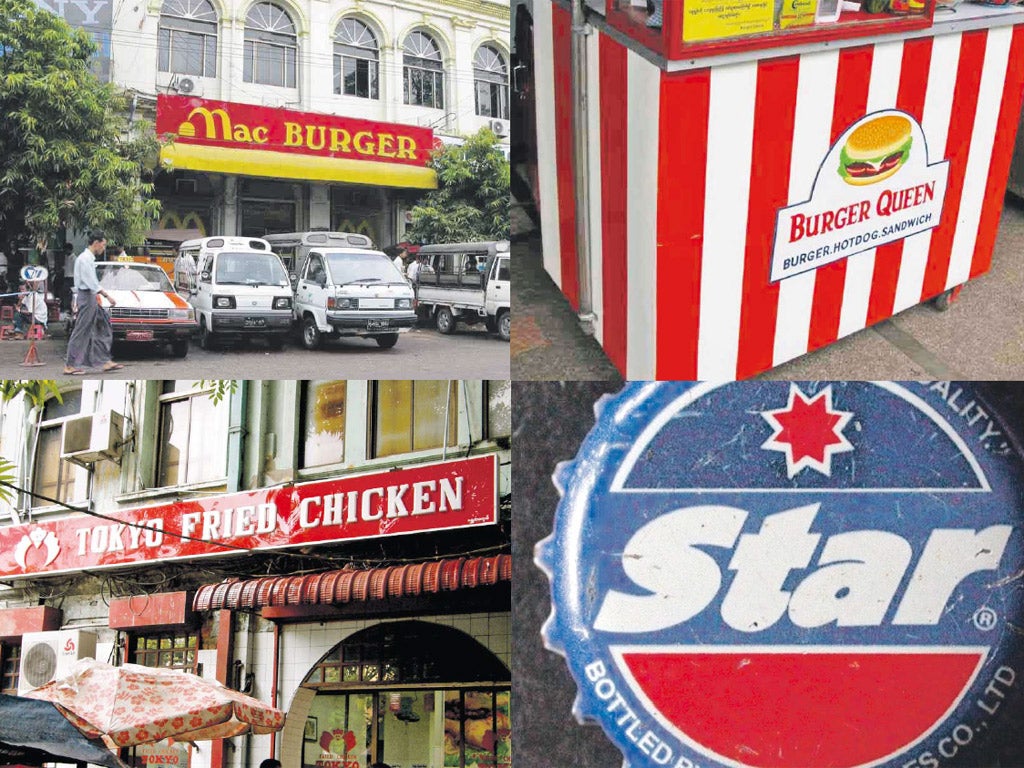
When PepsiCo decided to leave Burma in 1996, the company's local partner, Myanmar Golden Star (MGS), hit the jackpot. Forced out due to pressure by campaign groups, the US soft drinks giant left a factory on the outskirts of Rangoon. MGS then bought out Pepsi's stake, started producing "Star Cola" and proceeded to dominate the country's fizzy drinks market.
Now, after the West has started to ease sanctions in response to recent democratic reforms by the purportedly civilian regime headed by President Thein Sein, Pepsi is back in Burma with a different local partner.
"It doesn't really matter to us," said Oo Tun, managing director of MGS and the son of the company's founder, Thein Tun. Star Cola is not in a unique position. Copycat brands, fakes and grey imports are everywhere in Burma and, as globalisation suddenly confronts the nation, a large question mark hangs over the fate of many of these local products. In the years past, where McDonald's and KFC were barred by US sanctions, Mac Burger – with its red arches on a golden background – and Tokyo Fried Chicken for many years filled the fast-food vacuum.
Their more illustrious American rivals could soon be offering stiff competition. Following the visit of a sizeable delegation of US firms to Rangoon over the summer, a spokesman for the US regional business council said American fast-food chains were keen to enter Burma.
But as they eye new opportunities, Western brands must contend with the challenges posed by fakes. On the country's periphery, piracy is the key problem facing foreign firms. Pirated goods flood across the Chinese frontier further north, which in turn has made Burma a transit country for counterfeits bound for India, South-east Asia and beyond. Following recent Chinese crackdowns on pirated CDs and DVDs, many producers relocated to Burma's porous border areas like Mong La, a fiefdom in the "Golden Triangle" run by a former drug lord, according to the UN Office of Drugs and Crime.
In Mandalay and Rangoon, getting hold of a genuine copy of the latest album or film release remains almost impossible amid the flood of pirated discs. But the end of sanctions has prompted Western multinationals to fight back and reclaim their brands. When 20th Century Fox officially released the 2012 3D edition of Titanic in Rangoon last month – the first legal screening of a Hollywood hit in a generation – a company executive reportedly cited "protecting our intellectual property" as a key reason to return.
Companies have issued a flurry of trademark cautions in the local press, the only way they can protect their brands in Burma. Recently, lawyers working on behalf of Marriott Hotels, the healthcare products firm Johnson & Johnson and American cable broadcaster HBO have all issued such notices in the New Light of Myanmar.
Star cola replaced Pepsi when the firm left the country in 1996, while copycat brands also stepped in to fill the fast-food vacuum
Subscribe to Independent Premium to bookmark this article
Want to bookmark your favourite articles and stories to read or reference later? Start your Independent Premium subscription today.

Join our commenting forum
Join thought-provoking conversations, follow other Independent readers and see their replies